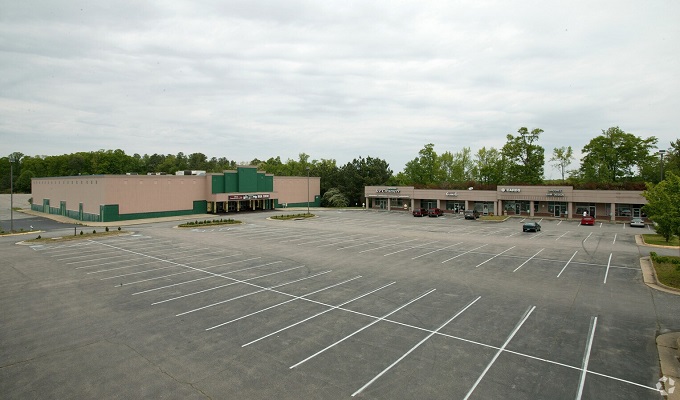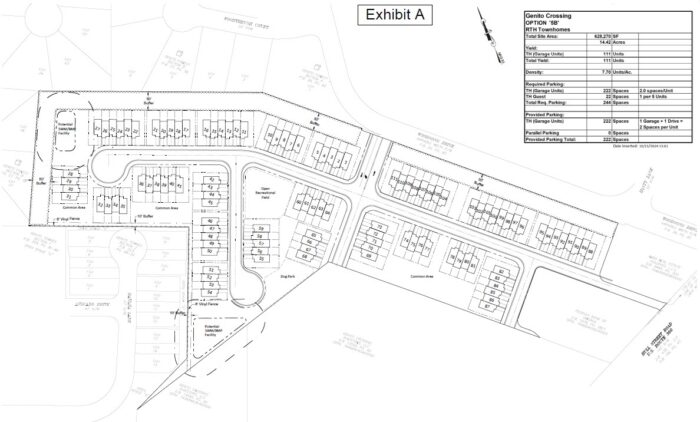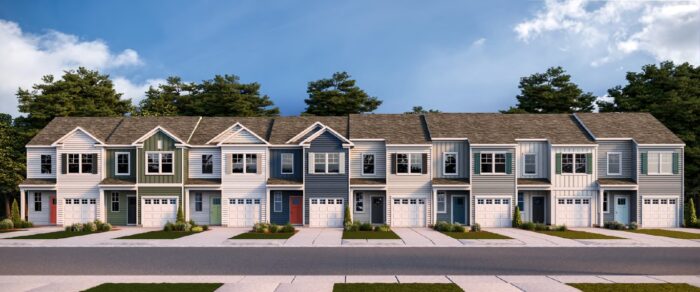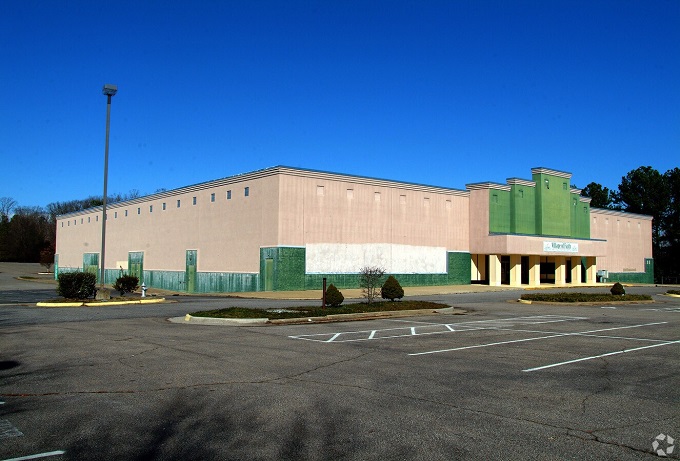
The 14-acre property is covered with surface parking and includes the movie theater-turned-church building and a retail strip. (File image courtesy LoopNet)
Over a year after it was first proposed, a plan to redevelop the site of a former cinema-turned-church near the intersection of Hull Street and Genito roads has been significantly scaled down in density.
An amended plan for Genito Crossing, a residential redevelopment of Village of Faith Ministries’ Southside location, calls for the 14-acre property at 11000 Hull Street Road to be filled with 111 for-sale townhomes, along with a central recreation area and other common areas.
The number of homes is less than half the proposed density of the original plan, which called for 232 units – 40 of those townhomes and the rest apartments.
Seven three-story buildings that would have housed the apartments closer to Hull Street Road have been replaced with additional clusters of the two-story townhomes, which are now oriented around roads that would connect to the adjacent Genito Crossing Shopping Center and Woodsong Drive.

The updated site plan shows the townhomes configured around roads that would connect to the adjacent shopping center. (County documents)
Feedback from county planning staff and neighbors prompted the changes, which were encouraged to provide more homeownership housing stock in the area, as well as a site layout that involved less surface parking area and more connectivity to the Food Lion-anchored shopping center, said Richard Saunders, a county planner working on the case.
“What was more important to us was the design and to have this development set up to have entrances into the shopping center to better relate to it,” Saunders said. “There’s a couple more connection points to get to and from, so folks that live here could easily walk over to the Food Lion shopping center.”
Saunders also noted that the changes reduce the amount of parking that would have been required for the apartments. Where the original plan called for 462 parking spaces, the revised plan totals 222.
“We really would have liked to see a little bit more traditional neighborhood design, in terms of more rear-loaded garages as opposed to having all these garages facing the street. But I think the layout we arrived at is probably the best of what they can do based on how the site’s laid out,” he said, adding that alleys, for example, would be difficult with the site’s configuration.

The two-story townhomes would be at least 1,200 square feet in size and include front-facing garages. (County documents)
Village of Faith is working on the project with homebuilding firm D.R. Horton, which is listed as the contract purchaser of the property. Representing them in negotiations with the county is a Hirschler team led by attorney Jeff Geiger, who did not return calls seeking comment.
Village of Faith is led by state delegate and former Richmond City Council member Michael Jones, the church’s senior pastor. Jones has said that the church, which is based in Sandston and plans to find another Southside location, had always considered the Hull Street site as an investment opportunity that could help increase housing availability in the area.
Since the original development plan was filed in 2023, Jones said he has tried to stay hands-off during the review process. But he said he went into it knowing that some changes to the proposal would be requested and made. In an interview this month, Jones said what he would like to see changed is the time it can take for a development process to play out.
“I think the long-term challenge – and this is a General Assembly issue down the road – is that these projects have got to move through quicker,” Jones said. “If we’re talking about having a housing shortage, which we know we have, it can’t take two, three, four, five years to get through the planning process.
“We know that around the Richmond area it will take three to five years before a shovel hits the ground. How do we streamline that process?” he said. “It’s not about developers making money, it’s not about the county not getting and/or getting what they need; it’s really about Virginians getting the housing stock that they need to keep housing affordable. It can’t take three to five years.”
The project would require a rezoning from existing commercial use to a residential townhouse district with a conditional-use planned development, according to county documents. An amended rezoning request reflecting the changes is listed as complete but is not yet scheduled to go before the Planning Commission or Board of Supervisors.
The new layout is described as providing greater buffers and separation between the townhomes and single-family detached homes adjacent to the site. It also includes a 50-foot landscaped buffer along Woodsong Drive and 6-foot-tall fence along the shopping center side.

The church’s Southside location is housed in the former Genito Cinema 9 complex. (File image courtesy LoopNet)
The development would replace a sea of parking lots and the existing church building, which was converted from the former Genito Cinema 9 complex, as well as a retail strip on the property that includes Mr. Pepe Mexican Restaurant. A Truist bank branch and NTB tire shop fronting Hull Street are not included in the project.
The townhomes would be at least 1,200 square feet in size and include front-loading garages and driveways. Planned amenities include a dog park, a recreational field, and the common areas that could include a play area, covered pavilion, fire pit, outdoor games, benches, hardscaped patio and outdoor eating area or similar improvements.
A project description by county planners states that Genito Crossing would transform property that is “ripe for development” and “known for dumping and unattractive uses within the parking lot behind the church.”
“This redevelopment will boost the surrounding area as a whole,” the description adds, “but in particular, will boost the neighboring shopping center, and could aid in future redevelopment of the shopping center as well.”
In addition to D.R. Horton, the project involves engineering firm Koontz Bryant Johnson Williams, which drew up the conceptual layout. As contract purchaser, D.R. Horton would buy the property from Village of Faith after rezoning is approved. The county has assessed the property at $1.67 million.
Saunders said a community meeting must be held before the case can go to the Planning Commission. A date for that meeting is not yet scheduled.

The 14-acre property is covered with surface parking and includes the movie theater-turned-church building and a retail strip. (File image courtesy LoopNet)
Over a year after it was first proposed, a plan to redevelop the site of a former cinema-turned-church near the intersection of Hull Street and Genito roads has been significantly scaled down in density.
An amended plan for Genito Crossing, a residential redevelopment of Village of Faith Ministries’ Southside location, calls for the 14-acre property at 11000 Hull Street Road to be filled with 111 for-sale townhomes, along with a central recreation area and other common areas.
The number of homes is less than half the proposed density of the original plan, which called for 232 units – 40 of those townhomes and the rest apartments.
Seven three-story buildings that would have housed the apartments closer to Hull Street Road have been replaced with additional clusters of the two-story townhomes, which are now oriented around roads that would connect to the adjacent Genito Crossing Shopping Center and Woodsong Drive.

The updated site plan shows the townhomes configured around roads that would connect to the adjacent shopping center. (County documents)
Feedback from county planning staff and neighbors prompted the changes, which were encouraged to provide more homeownership housing stock in the area, as well as a site layout that involved less surface parking area and more connectivity to the Food Lion-anchored shopping center, said Richard Saunders, a county planner working on the case.
“What was more important to us was the design and to have this development set up to have entrances into the shopping center to better relate to it,” Saunders said. “There’s a couple more connection points to get to and from, so folks that live here could easily walk over to the Food Lion shopping center.”
Saunders also noted that the changes reduce the amount of parking that would have been required for the apartments. Where the original plan called for 462 parking spaces, the revised plan totals 222.
“We really would have liked to see a little bit more traditional neighborhood design, in terms of more rear-loaded garages as opposed to having all these garages facing the street. But I think the layout we arrived at is probably the best of what they can do based on how the site’s laid out,” he said, adding that alleys, for example, would be difficult with the site’s configuration.

The two-story townhomes would be at least 1,200 square feet in size and include front-facing garages. (County documents)
Village of Faith is working on the project with homebuilding firm D.R. Horton, which is listed as the contract purchaser of the property. Representing them in negotiations with the county is a Hirschler team led by attorney Jeff Geiger, who did not return calls seeking comment.
Village of Faith is led by state delegate and former Richmond City Council member Michael Jones, the church’s senior pastor. Jones has said that the church, which is based in Sandston and plans to find another Southside location, had always considered the Hull Street site as an investment opportunity that could help increase housing availability in the area.
Since the original development plan was filed in 2023, Jones said he has tried to stay hands-off during the review process. But he said he went into it knowing that some changes to the proposal would be requested and made. In an interview this month, Jones said what he would like to see changed is the time it can take for a development process to play out.
“I think the long-term challenge – and this is a General Assembly issue down the road – is that these projects have got to move through quicker,” Jones said. “If we’re talking about having a housing shortage, which we know we have, it can’t take two, three, four, five years to get through the planning process.
“We know that around the Richmond area it will take three to five years before a shovel hits the ground. How do we streamline that process?” he said. “It’s not about developers making money, it’s not about the county not getting and/or getting what they need; it’s really about Virginians getting the housing stock that they need to keep housing affordable. It can’t take three to five years.”
The project would require a rezoning from existing commercial use to a residential townhouse district with a conditional-use planned development, according to county documents. An amended rezoning request reflecting the changes is listed as complete but is not yet scheduled to go before the Planning Commission or Board of Supervisors.
The new layout is described as providing greater buffers and separation between the townhomes and single-family detached homes adjacent to the site. It also includes a 50-foot landscaped buffer along Woodsong Drive and 6-foot-tall fence along the shopping center side.

The church’s Southside location is housed in the former Genito Cinema 9 complex. (File image courtesy LoopNet)
The development would replace a sea of parking lots and the existing church building, which was converted from the former Genito Cinema 9 complex, as well as a retail strip on the property that includes Mr. Pepe Mexican Restaurant. A Truist bank branch and NTB tire shop fronting Hull Street are not included in the project.
The townhomes would be at least 1,200 square feet in size and include front-loading garages and driveways. Planned amenities include a dog park, a recreational field, and the common areas that could include a play area, covered pavilion, fire pit, outdoor games, benches, hardscaped patio and outdoor eating area or similar improvements.
A project description by county planners states that Genito Crossing would transform property that is “ripe for development” and “known for dumping and unattractive uses within the parking lot behind the church.”
“This redevelopment will boost the surrounding area as a whole,” the description adds, “but in particular, will boost the neighboring shopping center, and could aid in future redevelopment of the shopping center as well.”
In addition to D.R. Horton, the project involves engineering firm Koontz Bryant Johnson Williams, which drew up the conceptual layout. As contract purchaser, D.R. Horton would buy the property from Village of Faith after rezoning is approved. The county has assessed the property at $1.67 million.
Saunders said a community meeting must be held before the case can go to the Planning Commission. A date for that meeting is not yet scheduled.




This still looks good in that the bulk of this land is large open parking lot that is abandoned.
They previously stated housing affordability as their goal — are these going to be affordable? Doubtful. This is the perfect place for apartments. They cite complaints from ‘neighbors’ as the reason — also doubtful that this carried that much weight. When neighbors complain about an ecological site, they’re basically ignored. When they complain about apartments? Oooh, you’re right, we should make them townhomes. Good call, neighbors. I’d love to know what the ‘county planning staff’ feedback was about why this site wasn’t appropriate for apartments.
Sorry, but home OWNERSHIP is a great thing for them to champion – nothing builds long term savings faster and with greater returns.
True, but they could have technically had apartments that could have been home owned?
I agree that that’s the traditional way to build generational wealth, however it’s simply not reasonable to expect that everyone is at a point in their life where they a) want to do so or b) can do so. As someone who owns a home where I’ve had to put a lot of cash into it to maintain it, it’s not a definite money maker and we shouldn’t make ownership the only housing option as a result. Making apartments available in areas that would be more likely to be served by public transportation is key.
Oh typically DR Horton are affordable. They just fall apart within the first 18 months.
They’re so bad their entire law firms dedicated to just suing that builder. Check out Texas BBB page where the HQ is located.
YES, work to shorten the development process!
Had to do a double take – Chesterfield is actually behind a plan that would reduce density? Watch out people, the sky is gonna fall!!
It’s a SIN to get rid of Mr. Pepes! And what good id Genito Townes do for that shopping center?!